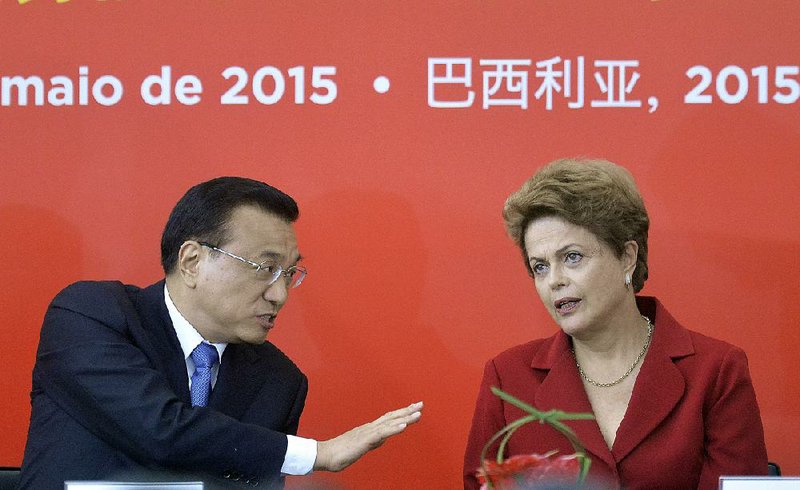RIO DE JANEIRO -- Chinese Premier Li Keqiang and Brazilian President Dilma Rousseff agreed Tuesday to embark on studies for a railway linking Brazil's Atlantic coast with a Pacific port in Peru, and announced billions in other investments and trade deals.
Rousseff emphasized the importance of the project to cut down the time and cost to move commodities to the Asian market.
"A new path to Asia will open for Brazil," said Rousseff. "It will cross our country from east to west, and the South American continent."
The memorandum of agreement to begin feasibility studies on the trans-Andean railway will also involve the Peruvian government. Rousseff invited Chinese companies to participate.
The stop in Brasilia is the premier's first on a four-nation South American tour that includes Chile, Peru and Colombia. It comes as the continent feels the pinch of lessening Chinese demand for its commodities.
"We're moving into a different era because China's economy is transforming to being consumer based, and it's slowing down, so commodity prices are going down," said Kevin Gallagher, professor of international relations at Boston University with expertise in China's ties to Latin America. "Chinese trade and investment was Latin America's best friend for a decade, and now everybody is in a panic."
China remains the top trading partner for Latin America and the Caribbean, with $112 billion of the region's exports heading to China in 2013, according to Gallagher. Li's trip began in Brazil with the signature of 35 agreements that total a $53 billion investment in infrastructure, energy and mining among other areas over the next six years.
Chinese banks will back projects of state-run oil company Petrobras for $7 billion, a relief for the firm embroiled in a corruption scandal that has blocked access from credit markets. The kickback investigation has implicated Brazil's biggest construction and engineering firms, delaying existing petrochemical complexes and key equipment needed to tap offshore fields works.
The Chinese government also agreed to buy 40 aircraft from the Brazilian company Embraer and to build an industrial park for car manufacturing in the state of Sao Paulo.
Despite the big investments in infrastructure projects, analysts caution such announcements don't always result in action.
Still, the timing for any influx of Chinese cash could not be better for Brazilians, whose economy is expected by analysts to shrink by at least 1 percent this year.
Li and Rousseff did not offer many details on the railroad, but the Brazilian leader said it should travel from the Atlantic coast in the state of Rio de Janeiro deep through the Amazon jungle states of Mato Grosso and Acre and cross the border into Peru to reach the Pacific Ocean. The project is estimated at $30 billion.
It's not clear yet when the feasibility studies will begin, and experts say given Brazil's infamous red tape on big infrastructure projects, it's likely many years away from being completed, if ever.
Plans for the railway, along with construction that's already begun on a China-backed waterway canal cutting across Nicaragua, are part of China's push to ease the delivery of the continent's commodities to its market.
Information for this article was contributed by Brad Brooks of The Associated Press.
Business on 05/20/2015
